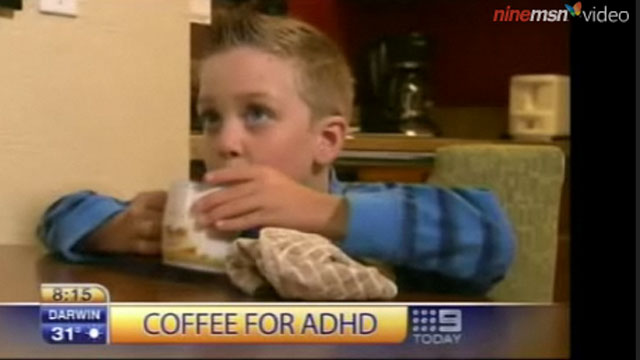WATCH: the video in the player above which highlights the difference between ADHD children and non-ADHD children when interviewed.
Mention ADHD (Attention Deficit Hyperactivity Disorder) and the first thing that comes to mind for many people is rowdy, boisterous children (usually boys) bouncing off the walls and unable to sit still. The reality is somewhat different.
The truth is that ADHD affects both sexes and all age groups. In fact, it is the most prevalent mental disorder of childhood affecting about 7 per cent of school-aged children worldwide.
The estimated annual cost of treatment and increased educational support in school-aged children in Australia is approximately $200 million. This figure does not take into account future economic loss due to disability from increased mental disorders, substance abuse, criminality, increased rates of unemployment and premature mortality.
Hyperactivity is only one part of ADHD and may not be relevant at all for some children. When it is present however, it’s worth noting that the hyperactivity often burns itself out by adulthood.
ADHD rarely exists alone. There are much higher rates of other mental health problems including anxiety, depression and trauma-related problems in this population. In addition, up to 50 per cent of children with ADHD have co-existing learning disabilities.

Hyperactivity is only part of ADHD and not be relevant for all children with the disorder. (Image: Getty Images)
What is ADHD?
ADHD is a term used to describe a neurodevelopmental disorder with a recognised and persistent pattern of behaviour. It is thought to be an inherited genetic disorder.
A neurodevelopmental disorder is a condition which usually manifests early in a child’s development, often before the child enters primary school, and are characterised by developmental deficits that produce impairments of personal, social, academic, or occupational functioning.
Key facts about ADHD are:
The symptoms of ADHD may reduce as the child grows and the brain matures.
Poor parenting is not to blame for ADHD, nor is either the parent or child with ADHD lazy.
ADHD is a disorder of executive functioning (the cognitive processes that are responsible for the cognitive control of behaviour).
Parenting behaviour, lifestyle choices and personality style can all improve or worsen ADHD symptoms.
Psychological support and medication can both be helpful in managing the disorder.
Early intervention is highly recommended in the treatment of ADHD.
What causes ADHD?
It’s possible that a number of factors may contribute to the development of ADHD but no-one knows for certain what the causes are. ADHD does tend to run in families so it is thought to be an inherited neurodevelopmental disorder, much as if a child’s eye colour or foot size may be inherited.
There are other theories about the cause of ADHD including oxygen deprivation around the time of birth, premature birth or low birth weight, brain injury, or exposure to chemical toxins in early childhood.
READ MORE: Do you have adult ADHD?

For some children, high levels of sugar, food colourings and preservatives may exacerbate symptoms but refraining from these will not ‘cure’ ADHD. (Image: Getty Images)
There is no evidence that food intolerances cause ADHD although it is possible that in some children high levels of sugar intake, food colourings and preservatives may worsen the symptoms. There is no evidence for claims by some chiropractors that “neonatal retained reflexes” cause ADHD.
WATCH: What’s it like to have ADHD? Post continues…
What are the signs and symptoms of ADHD?
There are times when we all struggle to concentrate, sit still, remember things or not do or say something impulsively. However, a child with ADHD will struggle with this persistently so that it impacts every aspect of their life, including their home life, school work and social relationships.
ADHD is characterised by developmentally inappropriate levels of inattention, impulsivity, and hyperactivity.
Key features of ADHD are:
Inattention
Distractibility
Hyperactivity
Impulsivity
What are the symptoms of inattentive ADHD?
Fails to give close attention to detail, makes careless mistakes
Has difficulty in sustaining attention in tasks or activities
Does not appear to listen when spoken to directly
Often does not follow through on instructions or fails to complete tasks
Often has difficulties organising tasks and activities
Often avoids, dislikes, or is reluctant to engage in tasks that require sustained mental effort
Often loses things necessary for tasks or activities
Is easily distracted by extraneous stimuli
Is often forgetful in daily activities

Kids being kids is very different to what true ADHD is. Inattentive ADHD presents very differently to the common perception of this neuro-developmental disorder. (Image: Getty Images)
What are the symptoms of hyperactive-impulsive behaviour?
Often fidgets with or taps hands or feet or squirms in seat
Often leaves seat in situations where remaining in seat is expected
Often runs about or climbs in situations where it is inappropriate (restlessness in adolescents and adults)
Often unable to play or engage in leisure activities quietly
Is often “on the go” acting as if “driven by motor”
Often talks excessively
Often blurts out answers before the question has been completed
Often has difficulty waiting their turn
Often interrupts or intrudes on others
WATCH: What is ADHD? Post continues…
What is ADD?
ADD is the old name for the ‘predominantly inattentive’ subtype. ADD is an old term that was removed from the diagnostic manual in 1994, but it is still in common usage. The correct name for the condition is now Attention Deficit Hyperactivity Disorder. This can lead to confusion because hyperactivity is not a symptom that is exhibited by all individuals.
Where to get help, information and support for ADHD
Australian ADHD Professionals Association (AADPA)
A useful book for parents, teachers and caregivers of children with ADHD providing facts and strategies is ‘ADHD Go-To Guide’ by Michele Toner and Desiree Silva
October is ADHD Awareness Month.
Information taken from ADHD WA and ADHD Australia.



